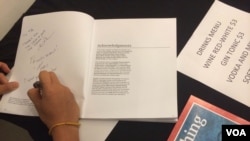Cambodian culture is not only Buddhist, but it contains trappings of animism and magic held over from its ancient history.
In Cambodia’s cities and countryside, you can find people who call themselves sorcerers, who believe they can channel spirits, or fortune-tellers who can read the stars, or cards, and tell you your fate. These beliefs are slowly disappearing, or at the very least changing, as Cambodia develops.
So last year, Ryun Patterson, a Chicago-based writer who worked as a journalist in Cambodia, put together a Kickstarter campaign to travel around the country and document as many magic practices as he could.
The result is a multimedia ebook called “Vanishing Act: A Glimpse Into Cambodia’s World of Magic.” On Wednesday, the book, accompanied by a photo exhibit from the research, was on display at an event at the Meta House in Phnom Penh.
Patterson, whose research included much travel with translators and photographer Rick Valenzuela, said the book was meant to “put you in our shoes, so you can experience the interviews like we did.”
The book is written in a clear, journalistic style, one that describes a “complex web of religions, gods and spirits,” making it accessible to people who may not know Cambodia well, Patterson said. “Things are simplified a little bit on purpose, to make sure that people understand what it’s like in Cambodia,” he said.
Through text, video, audio and photography, the book leads the reader through the process of discovery. In all, Patterson and his team interviewed 11 people, including a numerologist with nine wives, a monk, a cigarette-smoking sorcerer and a woman who channels the spirits of children—all with claims to different types of “magic.”
It describes a hidden world known well to most Cambodians, and it gives the back stories of people who use old traditions and a culture of magic as a means of helping other people, who may be ill, or worried, or who may just need advice on when to get married.
“I wanted people to experience what it was like for us to go meet these people and conduct interviews at these places, where it’s different from any other country in the world,” Patterson said. Most importantly, he wanted to describe a part of the world that is little understood and may one day disappear. “People don’t live forever,” he said, “and I want these people’s lives to be remembered somehow.”







